- Home
- Lucius Shepard
The Dragon Griaule Page 13
The Dragon Griaule Read online
Page 13
It was Brianne, but Brianne warped, melted, disfigured as a waxwork might be disfigured by heat. Her waist gone, features thickened, cheeks sagging into jowls. Shock washed away Catherine’s anger, and shock, too, materialized in Brianne’s face. ‘No,’ she said, giving the word an abstracted value, as if denying an inconsequential accusation; then she shouted it: ‘No!’ She slammed the door, and Catherine pounded on it, crying, ‘Damn you! Brianne!’
The child screamed, but Brianne made no reply.
Enraged, Catherine swung the hook at the door; the point sank deep into the wood, and when she tried to pull it out, one of the boards came partially loose; she pried at it, managed to rip it away, the nails coming free with a shriek of tortured metal. Through the gap she saw Brianne cowering against the rear wall of a dilapidated room, her arms around a little boy in shorts. Using the hook as a lever, she pulled loose another board, reached in and undid the latch. Brianne pushed the child behind her and grabbed a broom as Catherine stepped inside.
‘Get out of here!’ she said, holding the broom like a spear.
The gray poverty of the shanty made Catherine feel huge in her anger, too bright for the place, like a sun shining in a cave, and although her attention was fixed on Brianne, the peripheral details of the room imprinted themselves on her: the wood stove upon which a covered pot was steaming; an overturned wooden chair with a hole in the seat; cobwebs spanning the corners, rat turds along the wall; a rickety table set with cracked dishes and dust thick as fur beneath it. These things didn’t arouse her pity or mute her anger; instead, they seemed extensions of Brianne, new targets for hatred. She moved closer, and Brianne jabbed the broom at her. ‘Go away,’ she said weakly. ‘Please . . . leave us alone!’
Catherine swung the hook, snagging the twine that bound the broom straws and knocking it from Brianne’s hands. Brianne retreated to the corner where the wood stove stood, hauling the child along. She held up her hand to ward off another blow and said, ‘Don’t hurt us.’
‘Why not? Because you’ve got children, because you’ve had an unhappy life?’ Catherine spat at Brianne. ‘You killed my father!’
‘I was afraid! Key’s father . . .’
‘I don’t care,’ said Catherine coldly. ‘I don’t care why you did it. I don’t care how good your reasons were for betraying me in the first place.’
‘That’s right! You never cared about anything!’ Brianne clawed at her breast. ‘You killed my heart! You didn’t care about Glynn, you just wanted him because he wasn’t yours!’
It took Catherine a few seconds to dredge that name up from memory, to connect it with Brianne’s old lover and recall that it was her callousness and self-absorption that had set the events of the past years in motion. But although this roused her guilt, it did not abolish her anger. She couldn’t equate Brianne’s crimes with her excesses. Still, she was confused about what to do, uncomfortable now with the very concept of justice, and she wondered if she should leave, just throw down the hook and leave vengeance to whatever ordering principle governed the fates in Hangtown. Then Brianne shifted her feet, made a noise in her throat, and Catherine felt rage boiling up inside her.
‘Don’t throw that up to me,’ she said with flat menace. ‘Nothing I’ve done to you merited what you did to me. You don’t even know what you did!’
She raised the hook, and Brianne shrank back into the corner. The child twisted its head to look at Catherine, fixing her with brimming eyes, and she held back.
‘Send the child away,’ she told Brianne. Brianne leaned down to the child. ‘Go to your father,’ she said.
‘No, wait,’ said Catherine, fearing that the child might bring Zev Mallison.
‘Must you kill us both?’ said Brianne, her voice hoarse with emotion. Hearing this, the child once more began to cry.
‘Stop it,’ Catherine said to him, and when he continued to cry, she shouted it.
Brianne muffled the child’s wails in her skirts. ‘Go ahead!’ she said, her face twisted with fear. ‘Just do it!’ She broke down into sobs, ducked her head and waited for the blow. Catherine stepped close to Brianne, yanked her head back by the hair, exposing her throat, and set the point of the hook against the big vein there. Brianne’s eyes rolled down, trying to see the hook; her breath came in gaspy shrieks, and the child, caught between the two women, squirmed and wailed. Catherine’s hand was trembling, and that slight motion pricked Brianne’s skin, drawing a bead of blood. She stiffened, her eyelids fluttered down, her mouth fell open – an expression, at least so it seemed to Catherine, of ecstatic expectation. Catherine studied the face, feeling as if her emotions were being purified, drawn into a fine wire; she had an almost aesthetic appreciation of the stillness gathering around her, the hard poise of Brianne’s musculature, the sensitive pulse in the throat that transmitted its frail rhythm along the hook, and she restrained herself from pressing the point deeper, wanting to prolong Brianne’s suffering.
But then the hook grew heavy in Catherine’s hands, and she understood that the moment had passed, that her need for vengeance had lost the immediacy and thrust of passion. She imagined herself skewering Brianne, and then imagined dragging her out to confront a village tribunal, forcing her to confess her lies, having her sentenced to be tied up and left for whatever creatures foraged beneath Griaule’s wing. But while it provided her a measure of satisfaction to picture Brianne dead or dying, she saw now that anticipation was the peak of vengeance, that carrying out the necessary actions would only harm her. It frustrated her that all these years and the deaths would have no resolution, and she thought that she must have changed more than she had assumed to put aside vengeance so easily; this caused her to wonder again about the nature of the change, to question whether she was truly herself or merely an arcane likeness. But then she realized that the change had been her resolution, and that vengeance was an artifact of her old life, nothing more, and that her new life, whatever its secret character, must find other concerns to fuel it apart from old griefs and unworthy passions. This struck her with the force of a revelation, and she let out a long sighing breath that seemed to carry away with it all the sad vibrations of the past, all the residues of hates and loves, and she could finally believe that she was no longer the dragon’s prisoner. She felt new in her whole being, subject to new compulsions, as alive as tears, as strong as wheat, far too strong and alive for this pallid environment, and she could hardly recall now why she had come.
She looked at Brianne and her son, feeling only the ghost of hatred, seeing them not as objects of pity or wrath, but as unfamiliar, irrelevant, lives trapped in the prison of their own self-regard, and without a word she turned and walked to the steps, slamming the hook deep into the boards of the wall, a gesture of fierce resignation, the closing of a door opening onto anger and the opening of one that led to uncharted climes, and went down out of the village, leaving old Tim Weedlon’s thirst for gossip unquenched, passing along Griaule’s back, pushing through thickets and fording streams, and not noticing for quite some time that she had crossed onto another hill and left the dragon far behind. Three weeks later she came to Cabrecavela, a small town at the opposite end of the Carbonales Valley, and there, using the gems provided her by Mauldry, she bought a house and settled in and began to write about Griaule, creating not a personal memoir but a reference work containing an afterword dealing with certain metaphysical speculations, for she did not wish her adventures published, considering them banal by comparison to her primary subjects, the dragon’s physiology and ecology. After the publication of her book, which she entitled The Heart’s Millennium, she experienced a brief celebrity; but she shunned most of the opportunities for travel and lecture and lionization that came her way, and satisfied her desire to impart the knowledge she had gained by teaching in the local school and speaking privately with those scientists from Port Chantay who came to interview her. Some of these visitors had been colleagues of John Colmacos, yet she never mentioned their relationship, beli
eving that her memories of the man needed no modification; but perhaps this was a less than honest self-appraisal, perhaps she had not come to terms with that portion of her past, for in the spring five years after she had returned to the world she married one of these scientists, a man named Brian Ocoi, who in his calm demeanor and modest easiness of speech appeared cast from the same mold as Colmacos. From that point on little is known of her other than the fact that she bore two sons and confined her writing to a journal that has gone unpublished. However, it is said of her – as is said of all those who perform similar acts of faith in the shadows of other dragons yet unearthed from beneath their hills of ordinary-seeming earth and grass, believing that their bond serves through gentle constancy to enhance and not further delimit the boundaries of this prison world – from that day forward she lived happily ever after. Except for the dying at the end. And the heartbreak in between.
THE FATHER OF STONES
For Jack, Jeanne, and Jody Dann
One
How The Father of Stones came into the possession of the gemcutter William Lemos continues to be a subject for debate among the citizens of Port Chantay. That Lemos purchased the stone from the importer Henry Sichi is not in question, nor is it in doubt that Sichi had traded several bolts of raw silk for the stone to a tailor in Teocinte, and although the tailor has not admitted it, witnesses have clearly established that he took the stone by force from his niece, who had seen it glinting amid a clump of ferns growing beneath the lip of the dragon Griaule. But how the stone came to be in that spot at that exact moment, therein lies the cause of the debate. Some hold that the stone is a natural artifact of Griaule, a slow production of his flesh, perhaps a kind of tumor, and that it served to embody his wishes, to move Lemos – who lived beyond the natural range of his domination – to do the dragon’s bidding in the affair of the priest Mardo Zemaille and the Temple of the Dragon. Others will say that, yes, Griaule is indeed a marvel, a creature the size of a mountain, immobilized millennia before in a magical duel, who controls the population of the Carbonales Valley through the subtle exercise of his will and is capable of manipulating the most delicate and discreet of effects, the most complex of events; but to think that his tumors or kidney stones have the aspect of fabulous gems . . . well, that is stretching things a bit. Lemos, they claim, is merely attempting to use the fact of Griaule’s mastery to justify his crime, and doubtless The Father of Stones is a relic of the dragon’s hoard, probably dropped beneath the lip by one of the pitiful half-wits who inhabit his innards. Of course that’s how it got there, their opponents will say; do you believe Griaule incapable of such a simple machination as that of directing one of his minions to leave a stone in a certain place at a certain time? And as for the origin of the stone, here we have a vast, mysterious, and nearly immortal intelligence, one whose body supports forests and villages and parasites large enough to destroy a city – given all that, is the possibility that he might have fabricated The Father of Stones in some dark tuck of his interior really so far removed?
These arguments aside, the facts are as follows. One misty night in February some years ago, a young boy burst into the headquarters of the constabulary in Port Chantay, bursting with the news that Mardo Zemaille, the priest of the Temple of the Dragon, had been murdered, and that his assassin, William Lemos, was awaiting the pleasure of the constabulary at the temple gates. When the constables arrived at the temple, which was located a few hundred yards from the landward end of Ayler Point, they found Lemos, a pale sandy-haired man of forty-three with a pleasant yet unremarkable face and gray eyes and a distracted professorial air, pacing back and forth in front of the temple; after placing him in restraints, the constables proceeded onto the grounds, which were uncharacteristically deserted. In a corner building of the compound they discovered Zemaille lying crumpled beside an altar of black marble, his skull fractured, the fatal blow having been struck with a fist-sized gem of an inferior milky water, one side left rough, affording an excellent grip for someone wishing to hurl it, and the other side cut into a pattern of sharply edged facets. They also discovered Mirielle, Lemos’ daughter, stretched naked on the altar, drugged into a state of torpor. Port Chantay, while a fairly large city, was not so large that the constabulary had been unaware of the conflict between Lemos and Zemaille. Lemos’ wife Patricia, drowned in the waters off Ayler Point three years before (she had, it was rumored, been visiting her lover, a wealthy gentleman with a home at the seaward end of the point), had willed her portion of the gem-cutting business to Mirielle, and Mirielle, who had been deeply involved with the dragon cult and with Zemaille himself, had donated the half-share to the temple. Zemaille was accustomed to using rare gems in certain of his rituals, and he soon began to drain the resources of the shop; the imminent failure of the gemcutter’s business, along with his daughter’s rejection, her wantonness and sluttish obeisance to the priest, had driven him to the depths of despair and thence, it seemed, to murder. And so, with a confession in hand, one backed by clear motive and a wealth of physical evidence, the constables felt confident that justice would be swift and sure. But they had not reckoned on the nature of Lemos’ defense. Nor, it appeared from his initial reaction, had Lemos’ attorney, Adam Korrogly.
‘You must be mad,’ he told Lemos after the gemcutter had related his version of the events. ‘Or else you’re damned clever.’
‘It’s the truth,’ Lemos said glumly. He was slumped in a chair in a windowless interrogation room lit by a glass bowl depended from the ceiling that held clumps of luminous moss; he gazed at his hands, which were spread upon a wooden table, as if unable to accept that they had betrayed him.
Korrogly, a tall, thin, intense man with receding black hair and features that looked to have been whittled into sharpness out of smooth white wood, walked to the door and, facing it, said, ‘I see where you’re trying to lead me.’
‘I’m not trying to lead you anywhere,’ Lemos said. ‘I don’t care what you think, it’s the truth.’
‘You should care very much what I think,’ said Korrogly, turning to him. ‘In the first place, I don’t have to accept your case; in the second, my performance will be greatly abetted if I believe you.’
Lemos lifted his head and engaged Korrogly’s eyes with a look of such abject hopelessness that for an instant the attorney imagined it had struck him with a physical force. ‘Proceed as you will,’ Lemos said. ‘The quality of your performance matters little to me.’
Korrogly walked to the table and leaned forward, resting his hands so that the splayed tips of his fingers were nearly touching Lemos’ fingers. Lemos did not move his hands away, did not appear to notice the closeness of Korrogly’s hands, and this indicated that he was truly overborne by all that had happened, and not putting on an act. Either that, Korrogly thought, or the man’s got the nervous system of a snail.
‘You’re asking me to attempt a defense that’s never been used before,’ he said. ‘Now that I think of it, I’m amazed no one’s ever tried it. Griaule’s influence – over the Carbonales Valley, anyway – is not in doubt. But to claim you were enacting his will, that some essence embodied in the gem inspired you to serve as his agent, to use that as a defense in a criminal case . . . I don’t know.’
Lemos appeared not to have heard: after a moment he said, ‘Mirielle . . . is she all right?’
Irritated, Korrogly said, ‘Yes, yes, she’s fine. Were you listening to what I just said?’
Lemos stared at him uncomprehendingly.
‘Your story,’ Korrogly said, ‘appears to demand a defense that has never been used. Never. Do you know what will attend that?’
‘No,’ said Lemos, and lowered his eyes.
‘Judges are not delighted by the prospect of setting precedent, and whoever presides over your trial is going to be particularly loath to establish this sort of precedent. Because if it is established, God knows how many villains will seek to use it to avoid punishment.’
Lemos was silent for a f
ew seconds and then said, ‘I don’t understand. What do you wish me to say?’
Studying his face, Korrogly had a feeling of uneasiness: Lemos’ despair seemed too uniform, too all-encompassing. He had acted for a number of clients who had been in the grip of terrible despair, but even the most despondent of these had on occasion suddenly realized their plight and exhibited fright or desperation or some variant emotion. He had the idea that Lemos was an intelligent man, one capable of such a subtle deceit as this might be.
‘It’s not necessary that you say anything,’ he told Lemos. ‘I simply want you to understand the course you’ve set me. If I were to plead for mercy from the court, ask them to recognize the passions involved, to take into account the unscrupulous nature of the deceased, I’m confident that your sentence would be light. Zemaille was not well loved, and there are many who consider what you’ve done an act of conscience.’
‘Not I,’ said Lemos in such an agonized tone that Korrogly was persuaded for the moment to complete belief.
‘However,’ he went on, ‘should I pursue the defense that your story suggests, you may wind up facing a much harsher sentence, perhaps even the ultimate. That you choose to defend in this manner might imply to the judge that the crime was premeditated. Thus he would allow no mediating circumstance in his instructions to the jury. He would dismiss all possibility of it being a crime of passion.’
Lemos gave a dispirited laugh.
‘That amuses you?’ Korrogly asked.
‘I find it simplistic that passion and premeditation are deemed to be mutually exclusive.’

 Vacancy & Ariel
Vacancy & Ariel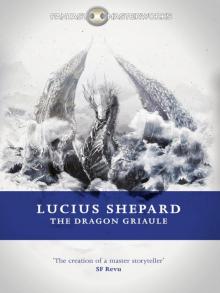 The Dragon Griaule
The Dragon Griaule The Ends of the Earth
The Ends of the Earth Two Trains Running
Two Trains Running Life of Buddha
Life of Buddha Louisiana Breakdown
Louisiana Breakdown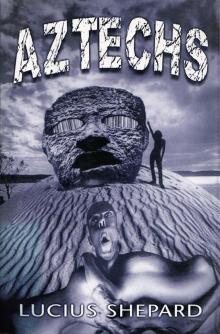 AZTECHS
AZTECHS Life During Wartime
Life During Wartime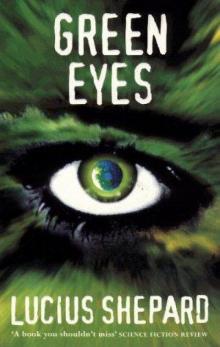 Green Eyes
Green Eyes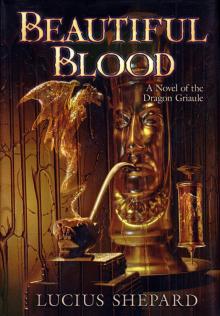 Beautiful Blood
Beautiful Blood Stars Seen Through Stone
Stars Seen Through Stone Viator
Viator Colonel Rutherford's Colt
Colonel Rutherford's Colt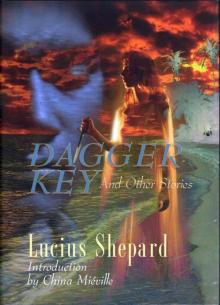 Dagger Key and Other Stories
Dagger Key and Other Stories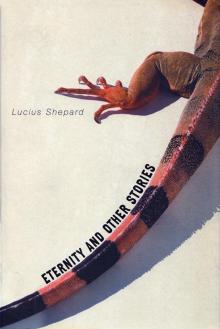 Eternity and Other Stories
Eternity and Other Stories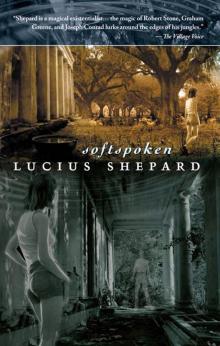 Softspoken
Softspoken The Golden
The Golden